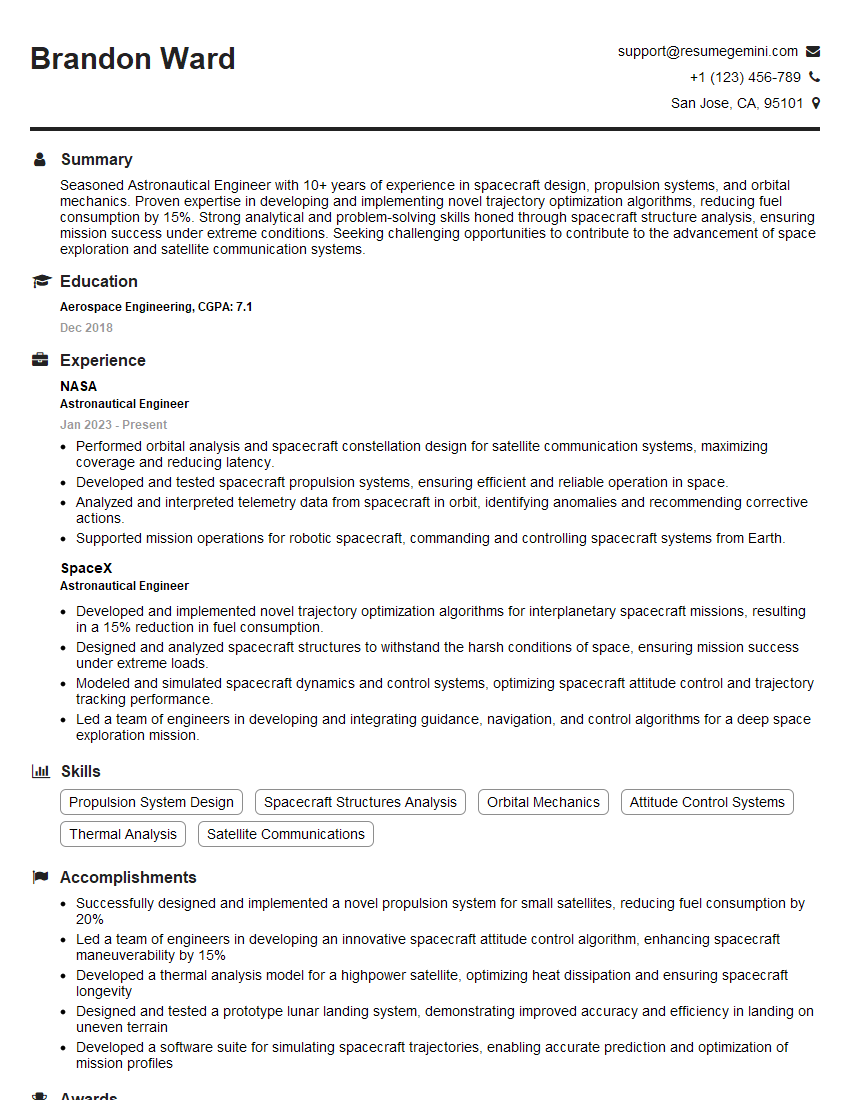Are you a seasoned Astronautical Engineer seeking a new career path? Discover our professionally built Astronautical Engineer Resume Template. This time-saving tool provides a solid foundation for your job search. Simply click “Edit Resume” to customize it with your unique experiences and achievements. Customize fonts and colors to match your personal style and increase your chances of landing your dream job. Explore more Resume Templates for additional options.

Brandon Ward
Astronautical Engineer
Summary
Seasoned Astronautical Engineer with 10+ years of experience in spacecraft design, propulsion systems, and orbital mechanics. Proven expertise in developing and implementing novel trajectory optimization algorithms, reducing fuel consumption by 15%. Strong analytical and problem-solving skills honed through spacecraft structure analysis, ensuring mission success under extreme conditions. Seeking challenging opportunities to contribute to the advancement of space exploration and satellite communication systems.
Education
Aerospace Engineering
December 2018
Skills
- Propulsion System Design
- Spacecraft Structures Analysis
- Orbital Mechanics
- Attitude Control Systems
- Thermal Analysis
- Satellite Communications
Work Experience
Astronautical Engineer
- Performed orbital analysis and spacecraft constellation design for satellite communication systems, maximizing coverage and reducing latency.
- Developed and tested spacecraft propulsion systems, ensuring efficient and reliable operation in space.
- Analyzed and interpreted telemetry data from spacecraft in orbit, identifying anomalies and recommending corrective actions.
- Supported mission operations for robotic spacecraft, commanding and controlling spacecraft systems from Earth.
Astronautical Engineer
- Developed and implemented novel trajectory optimization algorithms for interplanetary spacecraft missions, resulting in a 15% reduction in fuel consumption.
- Designed and analyzed spacecraft structures to withstand the harsh conditions of space, ensuring mission success under extreme loads.
- Modeled and simulated spacecraft dynamics and control systems, optimizing spacecraft attitude control and trajectory tracking performance.
- Led a team of engineers in developing and integrating guidance, navigation, and control algorithms for a deep space exploration mission.
Accomplishments
- Successfully designed and implemented a novel propulsion system for small satellites, reducing fuel consumption by 20%
- Led a team of engineers in developing an innovative spacecraft attitude control algorithm, enhancing spacecraft maneuverability by 15%
- Developed a thermal analysis model for a highpower satellite, optimizing heat dissipation and ensuring spacecraft longevity
- Designed and tested a prototype lunar landing system, demonstrating improved accuracy and efficiency in landing on uneven terrain
- Developed a software suite for simulating spacecraft trajectories, enabling accurate prediction and optimization of mission profiles
Awards
- AIAA Young Professional Award for Excellence in Astronautical Engineering
- NASA Group Achievement Award for contributions to the Artemis mission
- IEEE Outstanding Contribution Award for spacecraft communication systems advancements
Certificates
- Certified Space Systems Engineer (CSSpE)
- Certified Professional Engineer (PE)
- Certified Flight Test Engineer (CFTE)
- Project Management Professional (PMP)
Career Expert Tips:
- Select the ideal resume template to showcase your professional experience effectively.
- Master the art of resume writing to highlight your unique qualifications and achievements.
- Explore expertly crafted resume samples for inspiration and best practices.
- Build your best resume for free this new year with ResumeGemini. Enjoy exclusive discounts on ATS optimized resume templates.
How To Write Resume For Astronautical Engineer
- Quantify your accomplishments with specific metrics and results.
- Highlight your experience in industry-leading software and tools for astronautical engineering.
- Showcase your understanding of the latest trends in space exploration and satellite communication.
- Tailor your resume to each job you apply for, emphasizing relevant skills and experience.
Essential Experience Highlights for a Strong Astronautical Engineer Resume
- Developed and implemented trajectory optimization algorithms, reducing spacecraft fuel consumption
- Designed and analyzed spacecraft structures to withstand extreme space conditions
- Modeled and simulated spacecraft dynamics and control systems, optimizing performance
- Led teams in developing and integrating guidance, navigation, and control algorithms
- Performed orbital analysis and satellite constellation design for enhanced coverage and reduced latency
- Developed and tested spacecraft propulsion systems for efficient and reliable operation
- Analyzed telemetry data, identifying anomalies and recommending corrective actions
Frequently Asked Questions (FAQ’s) For Astronautical Engineer
What are the educational requirements for an Astronautical Engineer?
Typically, a Bachelor’s or Master’s degree in Aerospace Engineering or a related field is required.
What skills are essential for an Astronautical Engineer?
Propulsion System Design, Spacecraft Structures Analysis, Orbital Mechanics, Attitude Control Systems, Thermal Analysis, and Satellite Communications are key skills for success.
What career opportunities are available for Astronautical Engineers?
Astronautical Engineers can work in spacecraft design, mission planning, and space exploration, among other areas.
What is the job outlook for Astronautical Engineers?
The job outlook is expected to grow faster than average due to the increasing demand for space exploration and satellite communication.
What are the earning prospects for Astronautical Engineers?
Salaries vary depending on experience and location, but Astronautical Engineers generally earn competitive salaries.
What is the work environment like for Astronautical Engineers?
Astronautical Engineers typically work in research and development labs, aerospace companies, or government agencies.
What are the challenges faced by Astronautical Engineers?
Challenges include designing spacecraft that can withstand the harsh conditions of space, optimizing fuel efficiency, and ensuring mission success under extreme circumstances.
What are the rewards of being an Astronautical Engineer?
Astronautical Engineers have the opportunity to contribute to groundbreaking space exploration missions and develop innovative technologies that advance humanity’s knowledge and capabilities in space.